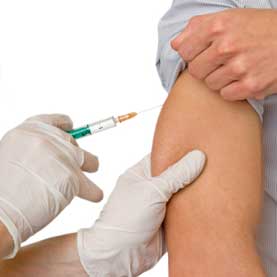
Question
Can influenza vaccine be administered to adult patients receiving chemotherapy?
Response from Joanna M. Pangilinan, PharmD
Pharmacist, Department of Pharmacy, University of Michigan, Ann Arbor
Patients with cancer are at risk for influenza complications, such as hospitalization or treatment delay.[1,2] Many guidelines provide guidance for influenza vaccination, and all agree that patients with cancer should receive the influenza vaccine annually.
Influenza vaccine response may be best if given between chemotherapy cycles (> 7 days after the last treatment) or more than 2 weeks before initiation of chemotherapy/immunosuppressive therapy.[3] If a patient is vaccinated less than 2 weeks before starting chemotherapy or while receiving therapy, he or she should not be considered protected and should be revaccinated at least 3 months after therapy discontinuation if immune function has been restored. Administration on the same day as chemotherapy is not advised.[1]
Because of the theoretical risk that a live-attenuated virus vaccine could cause infection in immunocompromised patients, inactivated influenza vaccine is recommended.[1,3] Live-attenuated virus vaccine should be avoided in patients receiving chemotherapy/radiation or within 6 months after the end of cytotoxic therapy before a patient is presumed immunocompetent.[1,3] In event of exposure to influenza infection, neutropenic patients should receive a 5-day post-exposure course of antiviral therapy, regardless of vaccination status.[3]
For hematopoietic stem cell transplant (HSCT) recipients, inactivated influenza vaccine generally is recommended 4-6 months after HSCT and then annually.[4,5] Response is typically best if vaccination is done more than 6 months after transplantation.[3] If the vaccine is given as early as 4 months after HSCT, a second dose should be considered.[4,5]
Live-attenuated influenza vaccine should not be administered to HSCT recipients or their household members.[4] Healthcare professionals and household members who have close contact with severely immunocompromised patients (such as HCST recipients) during periods in which the patient requires care in a protective environment should receive inactivated vaccine. Those who received live-attenuated virus vaccine should avoid providing care to severely immunocompromised patients requiring care in a protected environment for 7 days after vaccination.[2]
Because immunocompromise may cause incomplete protection from influenza vaccination, healthcare professionals should counsel patients with cancer and their caregivers about appropriate infection control practices. All household contacts should be vaccinated against influenza, and type of vaccine should be considered.
References
-
Baden LR, Bensinger W, Angarone M, et al. Prevention and treatment of cancer-related infections. J Natl Compr Canc Netw. 2012;10:1412-1445. Abstract
-
Centers for Disease Control and Prevention. Seasonal influenza (flu). Additional information about vaccination of specific populations. Influenza prevention and control recommendations. December 15, 2011.http://www.cdc.gov/flu/professionals/acip/specificpopulations.htm Accessed November 10, 2012.
-
Freifeld AG, Bow EJ, Sepkowitz KA, et al; Infectious Diseases Society of America. Clinical practice guideline for the use of antimicrobial agents in neutropenic patients with cancer: 2010 update by the Infectious Diseases Society of America. Clin Infect Dis. 2011;52:e56-e93. Abstract
-
Issa NC, Baden LR. Current issues in vaccines for adult patients with hematologic malignancies. J Natl Compr Canc Netw. 2012;10:1447-1454. Abstract
-
Centers for Disease Control and Prevention. Vaccination of hematopoietic stem cell transplant (HSCT) recipients. February 15, 2011. http://www.cdc.gov/vaccines/pubs/hemato-cell-transplts.htm Accessed November 10, 2012.





 留言列表
留言列表
 線上藥物查詢
線上藥物查詢 